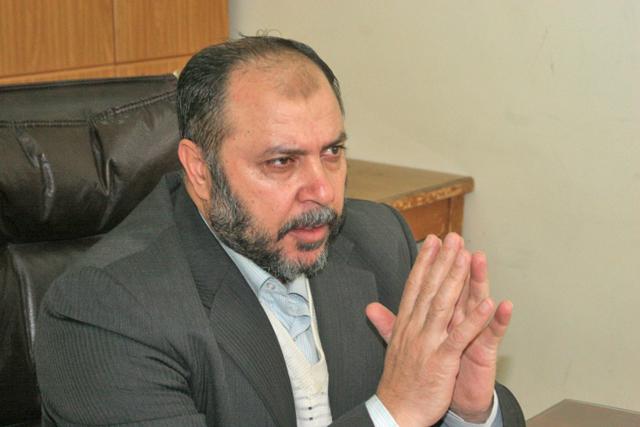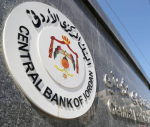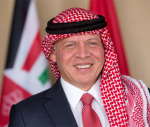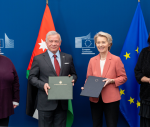You are here
Arrest of Brotherhood leader triggers debate
By Mohammad Ghazal , Taylor Luck - Nov 22,2014 - Last updated at Nov 22,2014

AMMAN — Jordan’s Muslim Brotherhood spoke out against authorities’ arrest of the movement’s deputy overall leader Zaki Bani Rsheid, calling his jailing a “political stunt”, while officials insisted that the hawkish politician broke the law.
Bani Rsheid was arrested at the Brotherhood’s Amman headquarters late Thursday for a post on his Facebook page prosecutors deemed harmful to the country’s ties with neighbouring states, describing the move as an attempt to “place pressure” on the Islamist movement.
Bani Rsheid criticised the UAE for adding the Brotherhood to its list of terror groups, following a crackdown on the group and its supporters.
“The arrest of Zaki Bani Rsheid was nothing less than an attack on the freedom of speech and an attempt to silence the opposition,” said Mohammed Zyoud, secretary general of the Brotherhood’s Islamic Action Front Party and a close confidant of Bani Rsheid. “Not only our organisation, but all of civil society will not remain silent.”
On Saturday, the Brotherhood appointed lawyers Hikmat Rawashdeh and Abdul Katter Al Khatib as the defence team for Bani Rsheid, who was transferred from Juweideh prison to the Marka correctional facility in northern Amman earlier in the day.
Authorities are expected to refer Bani Rsheid to the State Security Court for “acts harmful to the country’s relations with foreign states”, as per the recently amended Anti-Terror Law, next week.
The charge carries between two-and-a-half years to seven years in prison, according to the law.
Gov’t rejects accusations
Minister of Political and Parliamentary Affairs Khaled Kalaldeh dismissed accusations that the arrest was politically motivated.
“He violated the law and was detained as his statements in the article sour Jordan’s relations with a friendly country,” the minister said over the phone on Saturday.
“His statements endangered the interests of Jordanians and the country. We are proud of our ties with the UAE, which is a supporter of Jordan,” said the minister.
In his post, Rsheid accused the Emirates of supporting terrorism and questioned the legitimacy of its leaders. He called for expelling the UAE from the Arab League and accused it of standing behind all sabotage and destruction in the Arab world.
“This is not considered freedom of speech. This is a violation of the Constitution. It is not a political statement, but rather an act of slander,” Kalaldeh said.
On Friday, some 300 Islamists hit the streets in Irbid demanding “the immediate release” of Bani Rsheid, chanting “You can arrest us all — we are all Zaki Bani Rsheid”, eyewitnesses said.
The main architect behind the resurgence and sustained success of the Brotherhood’s conservative wing, Bani Rsheid is widely viewed as the most influential figure within the movement, directing its internal and external policies.
Opinion leaders
Key columnists contributed to the debate on Saturday. For political analyst Mohammad Abu Rumman, the decision to arrest Bani Rsheid was taken by the state under concerns of an angry reaction by the UAE, a major ally of the Kingdom, against the Islamist leader’s Facebook post. Quoting a veteran statesman, Abu Rumman added that authorities could not remain idle against Bani Rsheid’s “insulting” remarks against Abu Dhabi, being sure of “catastrophic” political and, more importantly, economic consequences on Jordan, citing the 225, 000 Jordanians working in the Gulf state.
Abu Rumman, a renowned expert in Islamist groups, also explained that Jordanian inaction on Bani Rsheid’s remarks could have been interpreted “wrongly” by Amman’s allies Abu Dhabi, Riyadh and Cairo which all have blacklisted the Muslim Brotherhood. “This is, in brief, the rationale behind the arrest of Bani Rsheid. There was no hidden agenda,” the writer said.
However, Abu Rumman indicated that the arrest of Bani Rsheid did not necessarily signal an escalation in the troubled government-Brotherhood ties, adding that such incidents have happened before.
The political scientist did not expect the government to blacklist the group, saying that Jordan’s political formula is different from that of the three Arab states that labelled the Islamist movement as a terrorist organisation.
Al Rai columnist Samih Maaytah said it is the Islamist movement that has to be blamed for the escalation and not the state.
The former media minister also said that the state has given the Islamist movement the chance to embark on a self-revision for its policies but this does not mean it will tolerate individual violations by the group’s members, especially when manifested in the form of “insults against an Arab brotherly state”. “If there is a crisis now in the Brotherhood-state relationship, it is the Islamists who should take the blame for mistaking the state’s silence as weakness.”
Related Articles
Defence attorneys representing Muslim Brotherhood Deputy Overall Leader Zaki Bani Rsheid have filed a bail request as dozens of lawyers lined up to join his defence team.
The State Security Court (SSC) heard the testimony of two prosecution witnesses on Sunday in the ongoing trial of Muslim Brotherhood Deputy Overall Leader Zaki Bani Rsheid.
The Cassation Court on Wednesday upheld the State Security Court’s ruling against the Muslim Brotherhood’s deputy overall leader, Zaki Bani Rsheid, rejecting an appeal filed by his lawyers.
















